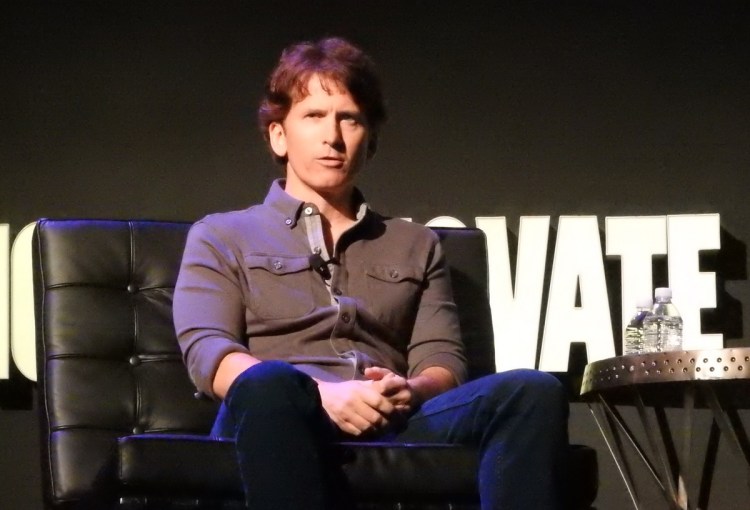LAS VEGAS — Todd Howard deserves a bit of a break.
His Bethesda Game Studios and parent ZeniMax shipped 12 million copies so far of Fallout 4, the blockbuster postapocalyptic role-playing game for PC and home consoles. But he teased today at the DICE Summit that the studio is working on three different projects for the future.
The tease will make the many millions of hardcore Bethesda fans salivate and speculate about what comes next for one of gaming’s most successful studios. Fallout 4 is up for Game of the Year at the DICE Awards, the Oscars of gaming at the DICE Summit, where Howard spoke with comedian Pete Holmes about the success of Fallout 4. It was also No. 3 on the best-seller charts at retail, contributing to the $13.1 billion games made at stores such as GameStop in 2015.
Bethesda is working on announced projects, such as downloadable content (DLC) for Fallout 4 throughout 2016 and Doom from Bethesda’s id Software studio. But Holmes peppered Howard with questions about what his team was making next. Howard’s job, of course, is to keep us on the edge of our seats and to keep us guessing.
“We are doing three longer-term projects,” Howard said. “We’ll talk about them in future. They are different from anything we have done before, while also being a Bethesda-style game.”
Holmes asked Howard again. And he said, “I teased enough. I’ll get in trouble.”
Much of the talk was a victory lap for Fallout 4, which had a team of 100 people and was in the works for four years, following the debut of The Elder Scrolls V: Skyrim role-playing game in 2011.
Howard said he was grateful for the success of Fallout 4, an open world game with 100,000 lines of dialogue and immense spaces full of objects you can interact with, from a companion dog to ash trays that you can collect. Howard said the game is expansive to suit whatever fans want to do.
With some games, you wonder if you can do things like modify two random items so that they work together. Such crafting and tinkering is becoming more popular with players.
“We like to build games that say ‘yes,'” he said. “They are still discovering that in the game.”
In fact, Howard said that one cool Easter egg, or hidden item, involves a “terminal” that players haven’t found yet. (Fallout 4 has tons of old computer terminals).
Howard said that the company’s teams have worked together for more than a decade or two decades.
“That’s one of the things that make us unique,” Howard said. “We don’t have to manage ourselves a lot. We can expand more than we have traditionally done. We opened a studio in Montreal for mobile stuff and other things. The shorthand of all of us working together is that it shows on the screen.”
The Bethesda team had to stay quiet for a long time, as the company didn’t even acknowledge the existence of Fallout 4 until June 2016 at the Electronic Entertainment Expo, the game industry’s big tradeshow. The game shipped just a short time later in November. For major tentpole releases like Fallout or Call of Duty, it’s almost unheard of for a game to have such a short hype cycle.
One of the brilliant moves that Bethesda made in 2015 was releasing Fallout Shelter, a mobile game where you built your own vault after the apocalypse, during the E3 fan event. It soared to the top of the charts on the iOS app store, and it even surpassed Candy Crush Saga for a short time on the top-grossing games list.
“Everything is successful. Look at all of the ways people can play games now, from smartphones to desktop and consoles,” he said. “We did a mobile game Fallout Shelter. There were four billion sessions. It was the most-played of any Fallout game. We wanted to do something smaller. It exploded. everyone is playing games now. It is part of their everyday experiences.”
Fallout 4 was a game that many people played for more than 100 hours, and it came out a time when there are a lot more streamlined games or even bite-sized games as competition. Howard said that the company made a bigger game because of the investment that players were willing to make in it.
“Fallout is a little more hardcore,” he said. “There can be confusing parts. Some of that is intentional. A player comes into a world he doesn’t know. there’s a fourth-wall anxiety. How do I make something? There’s an intimidation. But there’s a pay off when they say, ‘I get it now.'”
In survival mode, which is coming up for its release, Howard said it will get more difficult. You’ll have to play the game and have to eat, sleep, avoid getting diseases, and deal with challenges such as insomnia.
Howard said one of the touching moments of the success came when the Make A Wish Foundation brought in some kids who were dying, and they said they wanted to play Fallout 4 before it came out.
“They come and spend a day at the studio. It is great,” Howard said. “If you want to see the power of video games, it is condensed in those moments. It is amazing. They come with their parents. The parents change more from the beginning of the day to the end, and they have a new bond with their child. It’s amazing. That makes them realize how lucky we are to do this. This is important to people’s lives.”
VentureBeat's mission is to be a digital town square for technical decision-makers to gain knowledge about transformative enterprise technology and transact. Learn More




